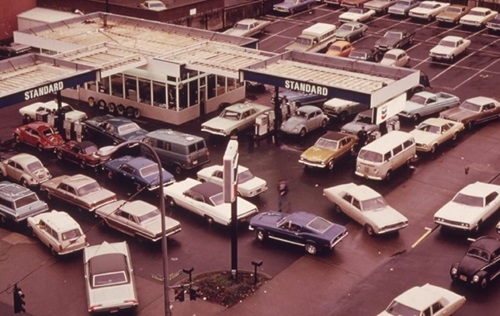Maximizing domestic energy fosters independence, security
 Less than 50 years after the 1973 Arab oil embargo, the United States has achieved energy independence—and is now a net energy exporter,producing more energy than it consumes.
Less than 50 years after the 1973 Arab oil embargo, the United States has achieved energy independence—and is now a net energy exporter,producing more energy than it consumes.
Line 5 plays a key role
July 7, 2021
Your parents or grandparents may remember this event: the 1973 Arab oil embargo and wars in the Middle East created a shortage of oil and caused long lines of cars at gasoline stations.
Some people waited in line for hours. It was a wake-up call the United States was too dependent on oversea sources for oil.
That accounts for 19% of the world’s production, propelling the U.S. to a level of energy independence and security not experienced since 1957.
The simplest definition of energy independence is that the United States becomes a net energy exporter—producing more energy than it consumes.
By that definition, the U.S. achieved energy independence in 2019, when energy production exceeded energy consumption for the first time since 1957, according to the United States Energy Information Administration (EIA). In 2020, the US became a net oil exporter for the first time since 1949, according to the EIA. That year, its oil imports also were the lowest in nearly 30 years.
Energy security key area of concern for many Michiganders
“Line 5 provides Michiganders the light crude oil used for jet fuel and natural gas liquids for propane that people rely on every day,” said Bob Lehto, Enbridge area operations manager for northern Michigan.
“Through reliable energy infrastructure and technological and logistical advancements, we no longer are subject to the fluctuations of world energy markets. Pipelines like Line 5 provide a stable, affordable supply of fuel and power that helps stabilizes energy bills, reduces the costs of energy in manufacturing and insulates the US from world events,” added Lehto.
“There is a positive effect on the supply chain that impacts everyone.”
At 83%, an overwhelming majority of Michiganders believes a shortage of propane and increased costs will result if Michigan Gov. Gretchen Whitmer prevails in her efforts idle Enbridge Line 5 in the Straits, according to recent survey results.
“Fortunately, this is not the 1970s,” Lehto continued. “The United States is the largest oil producer in the world. As we focus on the permitting process to construct the Great Lakes Tunnel Project, we are hoping to continue to work with the State to do what is in the best interests of meeting the region’s energy needs well into the future.”
“This effort is for the benefit of generations to come.”
Michiganders favor the Great Lakes Tunnel Project
The Great Lakes Tunnel Project will house a replacement section of Line 5 under the Straits, essentially eliminating the risk of an anchor strike to Line 5 or a release into the water. Approximately 70% of Michiganders recently surveyed favor construction of the project.
“Most Michiganders recognize Line 5 as critical,” said Lehto.
“In addition to providing propane and other fuels, Line 5 helps in the production of thousands of products – from medicine and clothing to solar panels and vehicles. Line 5 is important to this region and to the United States’ energy security and economic growth overall.”









